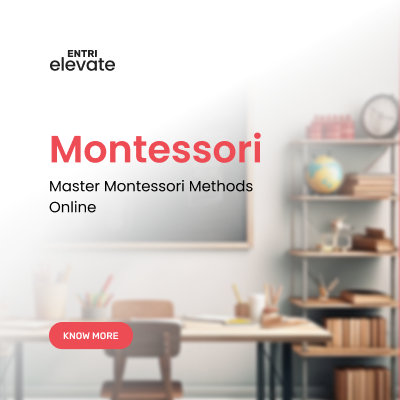Table of Contents
In the realm of education, Montessori teacher training plays an important role in enhancing the potential of educators who embrace the Montessori method. This method helps independent and holistic learning experiences for children, making it vital for trainers to undergo specialized training. One of the key aspects of Montessori teacher training is the effective utilization of Montessori materials. The materials are carefully designed to facilitate hands-on learning and foster independent exploration. This article presents the details of Montessori teacher training, its importance, aims and goals, and the skills it imparts. If you are someone looking out for ways to build your career in this stream, do check this completely.
Start your journey to becoming a certified Montessori teacher! Get free Demo Here!
What is Montessori Education?
Montessori education is based on the belief that children have an innate desire to learn and explore their environment. It emphasizes a child-centred approach, where educators act as facilitators, guiding children through self-directed activities in a carefully prepared environment. In a Montessori classroom, one can find a wide range of engaging materials and activities that cater to various aspects of a child’s development, including cognitive, physical, social, and emotional. The Montessori Method encourages hands-on learning, allowing children to actively engage with materials and develop their problem-solving skills. This approach fosters a sense of autonomy, responsibility, and a lifelong love for learning.
Dr Maria Montessori, an Italian physician and educator, developed this progressive method based on her observations of child behaviour and learning patterns. Montessori education focuses on self-directed activity, hands-on learning, and collaborative environments to cultivate a child’s natural curiosity and love for learning.
Montessori Teacher Training – Insights
1: What is the primary focus of the first plane of development in the Montessori method?
One of the strengths of Montessori teacher training lies in its hands-on approach. Aspiring educators have the opportunity to observe experienced teachers in action and engage with children in a real Montessori classroom. This practical experience provides valuable insights into implementing the Montessori principles and techniques, witnessing firsthand how children thrive in a prepared environment. Montessori teacher training covers a wide range of subjects, including child development, Montessori materials, and lesson planning. This comprehensive understanding allows teachers to create engaging and well-rounded learning experiences for their students.
Observation is a cornerstone of Montessori education. Through teacher training, educators develop keen observational skills, enabling them to understand and respond to the unique needs and interests of each child. This insight allows teachers to tailor their lessons, materials, and classroom environment to promote optimal learning and growth.
Unlock your passion for education and shape young minds as a Montessori teacher!
Montessori Teacher Training – Importance
Montessori teacher training programs aim to develop educators who are sensitive to the needs of each child, adaptable to various learning styles, and skilled in facilitating independent exploration. Educators learn strategies to create a supportive and inclusive classroom community, where children learn to collaborate, communicate, and develop empathy. Its emphasis on social skills nurtures emotional intelligence, builds positive relationships, and prepares children for success in their personal and social lives. Montessori teacher training is a continuous journey of professional growth.
Educators have opportunities to engage in ongoing professional development, attend conferences, and collaborate with fellow Montessori educators. This commitment to lifelong learning ensures that teachers stay updated with the latest research, methodologies, and best practices, enhancing their ability to provide high-quality education. By understanding the Montessori philosophy, mastering materials and techniques, honing observational skills, and promoting social and emotional growth, teachers become catalysts for children’s success
Montessori Teacher Training – Objectives
The primary objectives of Montessori teacher training are to ensure educators understand and internalize the Montessori philosophy, implement effective teaching practices, and create an optimal learning environment. This objective ensures that teachers stay updated with the latest research, methodologies, and best practices in Montessori education. By participating in workshops, conferences, and collaborative learning opportunities, educators continuously enhance their skills and deepen their understanding, ultimately benefiting the children they teach.
Montessori teacher training serves crucial objectives in equipping educators with the necessary skills, knowledge, and insights to create child-centred learning environments. By understanding the Montessori philosophy, mastering materials and techniques, developing observational skills, creating prepared environments, fostering social and emotional growth, and engaging in continued professional development, educators become catalysts for children’s success. Supervised practicum experiences allow trainees to apply their knowledge in real classroom settings under the guidance of experienced Montessori educators.
Learn the Montessori philosophy, classroom management techniques, and hands-on activities!
Curriculum
Montessori teacher training programs cover a diverse range of subjects to equip educators with the necessary skills. The curriculum includes child psychology, Montessori philosophy and methodology, curriculum development, observation and assessment, and classroom management. Trainees learn strategies to establish a positive and respectful classroom environment, encourage collaboration, and promote a sense of community. These skills empower educators to create an inclusive and harmonious atmosphere where children feel supported and motivated to learn.
The curriculum of Montessori teacher training is a comprehensive and well-rounded educational journey for aspiring educators. By encompassing the Montessori philosophy, child development, curriculum areas, lesson planning, observation, assessment, classroom management, and community building, the curriculum equips educators with the necessary tools and insights to create dynamic and engaging learning environments
Skills Acquired
Montessori teacher training equips educators with a broad spectrum of skills necessary to create engaging and effective learning environments. These skills include observation and assessment techniques, classroom management strategies, the ability to develop individualized lesson plans, understanding developmental milestones, fostering independence and self-discipline, and cultivating effective communication with students, parents, and colleagues. Montessori teacher training equips educators with a wide range of skills essential for educational excellence. Through honing observational skills, mastering Montessori materials, refining lesson planning and presentation, developing effective classroom management, fostering communication and collaboration, and embracing flexibility and adaptability, teachers become well-prepared to create dynamic and engaging learning environments.
Montessori-trained teachers are adept at guiding children through their educational journey, respecting their individuality and nurturing their natural abilities. Montessori teacher training cultivates adaptability and flexibility in educators. By embracing the principles of child-centred education, teachers learn to respond to the evolving needs and interests of each child. They become skilled at modifying their instruction, materials, and classroom environment to meet individual learning styles, challenges, and strengths. This adaptability ensures that every child receives the support necessary for their growth and development.
Montessori Teacher Training – Future
The future of education demands a commitment to lifelong learning and collaboration. Montessori teacher training instils in educators a passion for continuous growth and professional development. By engaging in collaborative communities of practice, attending conferences, and staying informed about research and best practices, Montessori-trained teachers are well-positioned to inspire a culture of lifelong learning in their students. They serve as role models who value collaboration, curiosity, and the pursuit of knowledge, preparing students to become lifelong learners themselves.
Montessori teacher training holds immense promise for the future of education. By embracing a child-centred approach, nurturing holistic development, fostering critical thinking and problem-solving skills, embracing adaptability, and promoting lifelong learning and collaboration, Montessori-trained educators are well-equipped to shape the future of education. Additionally, ongoing professional development opportunities enable Montessori teachers to stay up-to-date with the latest research, techniques, and innovations in education, ensuring they continue to evolve and provide the best learning experiences.
Start your journey to becoming a certified Montessori teacher! Get free Demo Here!










